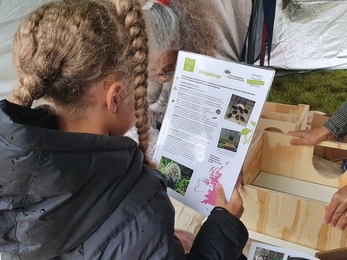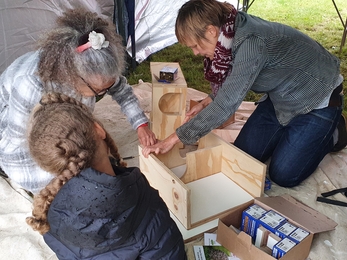No wonder they’re popular, because they’re amazing – and not just because they’re cute. They can smell an insect even if it’s two cm under the ground. They have between 5000-7000 spines, and, incredibly, they can travel between one and two km in a night. Shockingly, however, their populations have declined in the past 50 years from 30 million to 500,000.
Luckily, we can help by creating habitats for them - including hedgehog houses. That's what people living near one of our My Wild City sites on Bristol's Northern Slopes did last week. As part of a week-long hedgehog project with Knowle West Media Centre, locals were invited to build homes for the hedgehogs in their community. You can do this yourself by getting an old box such as a wooden wine crate, wood to make a tunnel, and then filling the box with dry leaves or straw to keep the hedgehogs warm. Put it in the quietest part of the garden and cover with leaves or logs.
As 5 November approaches, it’s important to remember that bonfires are dangerous for hedgehogs. Woodpiles make ideal shelter, and sadly many hedgehogs fall foul of un-checked bonfires and are killed because of it. So here is a useful check-list:
- Build the bonfire on the same day that you will light it. The longer it’s left, the more likely a hedgehog will wander in.
- Place chicken wire one metre high, at an outward angle, all the way around the bottom while you're building it.
- Always place the bonfire on open ground – never on a pile of leaves as a hedgehog may be hiding underneath.
- Always check the entire bonfire for hedgehogs before lighting it. They tend to hide in the centre and bottom two feet in particular.
- When checking, lift parts of the bonfire section by section using a pole or broom. Do not use a fork, spade or rake as this may injure a hedgehog.
- Use a torch to look inside the bonfire and listen for a hissing sound, as this is the noise that hedgehogs make when they are disturbed or distressed.
- Light your bonfire from one corner, rather than in the centre, in order to give hedgehogs a chance to escape if they need to.



